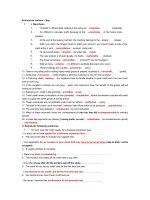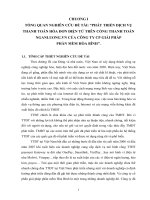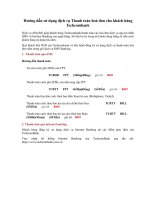Factoring - Tiếng Anh
Bạn đang xem bản rút gọn của tài liệu. Xem và tải ngay bản đầy đủ của tài liệu tại đây (106.59 KB, 8 trang )
FACTORING
Do you have clients that take 30, 50 or 60 days to pay their invoices? Although having slow paying
clients is expected in today’s business environment, they make managing cash flow a very difficult task.
Paying suppliers, salaries and rent becomes a challenge.
However, there is a way to solve this problem. The solution involves factoring your invoices.
Introduction
Factoring - also known as 'debt factoring' - involves selling your invoices to a third party. In return they
will process the invoices and allow you to draw funds against the money owed to your business.
Essentially, these companies provide a finance, debt collection and ledger management service.
It is commonly used by businesses to improve cash flow but can also be used to reduce administration
overheads. Businesses that supply this service are called factors or debt factoring companies.
This guide gives information on how factoring work, the advantages and disadvantages, different types
of factoring, the cost, and how to choose a factor.
Advantages and disadvantages of factoring
There are numerous advantages to factoring, but also some potential drawbacks.
Advantages
Factoring provides a large and quick boost to cash flow. This may be very valuable for businesses that
are short of working capital. A business that is owed £500,000 may be able to get £400,000 or more in
just a few days.
Other advantages:
• There are many factoring companies, so prices are usually competitive
• It can be a cost-effective way of outsourcing your sales ledger while freeing up your time to manage
the business
• It assists smoother cash flow and financial planning
• Some customers may respect factors and pay more quickly
• You may be given useful information about the credit standing of your customers and they can help
you to negotiate better terms with your suppliers
• Factors can prove an excellent strategic - as well as financial - resource when planning business
growth
Đỗ Hoài Phương – TTQT C - K11
1
• You will be protected from bad debts if you choose non-recourse factoring
• Cash is released as soon as orders are invoiced and is available for capital investment and funding of
your next orders
• Factors will credit check your customers and can help your business trade with better quality
customers and improved debtor spread
Disadvantages
Queries and disputes may have to be referred on. For this reason, factoring works best when a business is
efficient and there are few disputes and queries.
Other disadvantages:
• The cost will mean a reduction in your profit margin on each order.
• It may reduce the scope for other borrowing - book debts will not be available as security.
• Factors will restrict funding against poor quality debtors or poor debtor spread, so you will need to
manage these funding fluctuations.
• It may be difficult to end an arrangement with a factor as you will have to pay off any money they
have advanced you on invoices if the customer has not paid them yet.
• Some customers may prefer to deal directly with you.
• How the factor deals with your customers will affect what your customers think of you. Make sure
you use a reputable company that will not damage your reputation.
• You have to pay extra to remove your liability for bad debtors.
How factoring works
Factoring provides a fast prepayment against your sales ledger. It allows you, at a cost, to flexibly
increase your working capital and improve cash flow.
Factoring is offered to businesses trading with other businesses on credit terms. It is not normally
available to retailers or to cash traders.
When factoring starts
Factors can be independent, or subsidiaries of major banks and financial institutions. Whatever their
background, they will want to meet you, visit your business, review your financial situation and study
your business plan to evaluate your suitability for a factoring facility.
Credit limits might be required - if so, you must agree how they will operate.
After signing an agreement, the factor will typically agree to advance up to 85 per cent of approved
invoices. Payment is usually made available within 24 hours. Usually all sales go through the factor.
Check the notice period to the end of the service - most factors require three months' notice, but some
require longer. Negotiate if you are not happy with the notice period.
Đỗ Hoài Phương – TTQT C - K11
2
Factoring is a complex, long-term agreement. It is advisable to consult your solicitor on the legal and
financial implications of factoring.
When an invoice is raised
• You raise an invoice, which has instructions to pay the factor directly and send it to the customer.
Send a copy of the invoice to the factor.
• The factor makes available an agreed percentage of the invoice for you to draw as you require.
• The factor issues statements to the customer on your behalf. It operates credit control
procedures including telephoning the customer if necessary.
When an invoice is paid by the customer
• The customer should pay 100 per cent of the invoice directly to the factor.
• The factor pays the balance of the invoice to you.
When an invoice is not paid
If an invoice is not paid, responsibility for paying the debt will depend on the type of agreement - either
recourse factoring or non-recourse factoring
Charges
The agreed factoring fee is taken when the invoice is received by the factor. The discount charge works
like interest and is calculated against the balance of funds drawn and usually applied on a monthly basis.
With-recourse factoring and without-recourse factoring
In with-recourse factoring, the factor does not take on the risk of bad debts. Put another way, the factor
will be able to reclaim their money from you if the customer does not pay. The factoring agreement will
specify how many days after the due date for payment you must refund the advance.
Whether you refund the advance or not, you will still have to pay the fee and interest. With-recourse
factoring is cheaper than without-recourse factoring and may have fewer requirements concerning your
customers and your systems. This is because you are taking the bad debt risk. For example:
• The factoring agreement requires payment to be made within no more than three months. It also
states that 80 per cent of each invoice will be advanced.
• On 30 April an invoice for £10,000 is issued and the factor advances £8,000.
• On 31 July, if the customer has not paid, £8,000 must be repaid to the factor. There is no refund of
the factoring fees relating to the debt.
Đỗ Hoài Phương – TTQT C - K11
3
Without-recourse factoring
In without-recourse factoring, the factor takes on the bad debt risk. It accepts specified risks around the
debtor's failure to pay, but it does not insure against debts that are unpaid because of genuine disputes.
Because of this, without-recourse factoring will be more expensive than with-recourse factoring.
You never have to refund the advance to the factor, but you must pay interest to the factor for the period
specified by the factoring agreement.
The factor takes over all your rights to pursue the customer for payment. This includes the right to take
legal action.
The cost of factoring
The costs of factoring are usually reasonable. It's a competitive business with many suppliers so it pays
to shop around.
Of course, cost should not be the only consideration. Quality of service is also important.
When signing any agreement check the notice period to end to service - most factoring companies
require three months' notice. However, some companies have notice periods of up to a year which could
prove expensive for your business. If you are not happy with the notice period don't be afraid to
negotiate.
Factoring is a complex, long-term agreement that could have a major effect on the management and
development of your business. It is therefore advisable to consult your solicitor on the legal and financial
implications of factoring.
Standard costs arise in two ways - interest and fees. There may be additional costs for additional
requested services.
Discount charges
Discount charges work in exactly the same way as bank interest.
Typical charges range from 1.5 per cent over base rate to 3 per cent over base rate. The discount charge
is calculated on a daily basis and usually applied monthly.
These rates are roughly equivalent to bank overdraft rates and can even be more advantageous.
Credit management fees
There will be a fee for credit management and administration. The amount will depend on your turnover,
the volume of your invoices and the number of customers you have.
Typical fees range from 0.75 per cent of turnover to 2.5 per cent of turnover.
Đỗ Hoài Phương – TTQT C - K11
4
Credit protection charges
These will be levied in non-recourse factoring arrangements, where the factor is liable for any bad debts.
The amount will largely depend on the factor's assessment of the level of risk.
Typical charges range from 0.5 per cent of turnover to 2 per cent of turnover.
Export factoring
Some factoring companies offer a facility for the financing of international sales. They will typically
work with a partner abroad who will be responsible for the collection of payment in the country to which
you export. The services of a local agent will prevent any problems that could arise because of
differences in laws, customs, language and time differences.
In terms of credit limits and process, there is no material difference between local and international
factoring and invoice discounting.
Some factors will offer you the choice of being paid in sterling or in another currency. You should
carefully evaluate which is to your advantage. If your customer insists on being invoiced in their
country's currency, consider investing in protection against currency fluctuations. Factors may approve a
lower level of prepayment for export invoices than for local sales.
Requirements for export factoring
• You normally only need to have an annual turnover of at least £100,000. This can include domestic
sales.
• Companies based in the European Union (EU) can still factor debts owed from other EU countries if
sales within that country are relatively small.
• Outside the EU higher sales to a single country will be required. For the USA annual sales of
£500,000 will typically be necessary.
Export factors will usually drive a harder bargain if the volume of sales is low.
Features of export factoring
• You can choose to invoice in one currency and be paid in another. Many customers prefer to be
invoiced in their own currency.
• You can be protected against currency fluctuations.
• The cost of export factoring is usually slightly higher than the cost of domestic factoring, but less
than the cost of export finance.
• You can minimize the bad debt risk by purchasing credit protection. Most factors insist on this.
Đỗ Hoài Phương – TTQT C - K11
5









